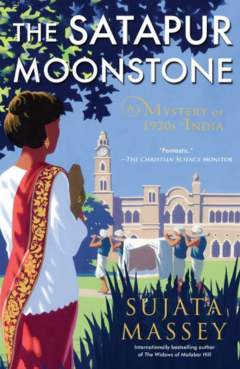The Satapur Moonstone

This novel is the second in the Perveen Mistry detective series, set in 1920s pre-independence India. Perveen is a female solicitor, still a rare thing in the early days of the twentieth century. Having obtained her law degree at Oxford she works for Mistry Law, her family’s legal practice in Bombay (now Mumbai) with her father and grandfather.
Her latest assignment comes about because of her involvement in a previous case where a family of ladies in purdah required legal advice (The Widows of Malabar Hill). In Perveen’s latest case she is again asked to act for purdah ladies, this time for the two widowed Maharanis of the state of Satapur, one of the Princely States. As its Maharaja is only a child, governance of the state is overseen by a British agent, Colin Sandringham. He needs Perveen’s help to adjudicate a dispute between the royal ladies about the young Maharaja's education. His mother wishes Prince Jiva Rao to go to school in England, but her formidable mother-in-law does not want the boy to be sent away, least of all to England. The prince has a younger sister, Padmabai but true to the priorities of the era, her education wasn't considered of importance to the powers that be.
There are hints of unease in the palace, apparent to Perveen when she is admitted to the royal apartments and has interviews with the two ladies. Both are concerned for the young prince’s safety; the previous ruler was Jiva Rao’s older brother who met with a fatal accident while on a tiger shoot. But who would want the rulers dead? Could it be the boys’ uncle perhaps? Or are British interests behind the mystery? Perveen tries to build relationships with the maharanis and to navigate the undercurrents in the palace, talking to the servants, the tutor Mr Basu and the palace jester, Aditiya but she finds more answers than questions.
This is a satisfying and enjoyable mystery, with an old palace secret revealed towards the end (no plot spoilers!). I will certainly be looking for the next one in the series. Perveen has ambitions for her career but knows that not everyone is willing to accept the idea of female lawyers. It will be interesting to see where her career takes her in future novels. The author conveys well the cultural, political and religious mores of the period. This is all complicated by the protocols and politics around the status of the royalty of the Princely States, as Perveen discovered in this case.












